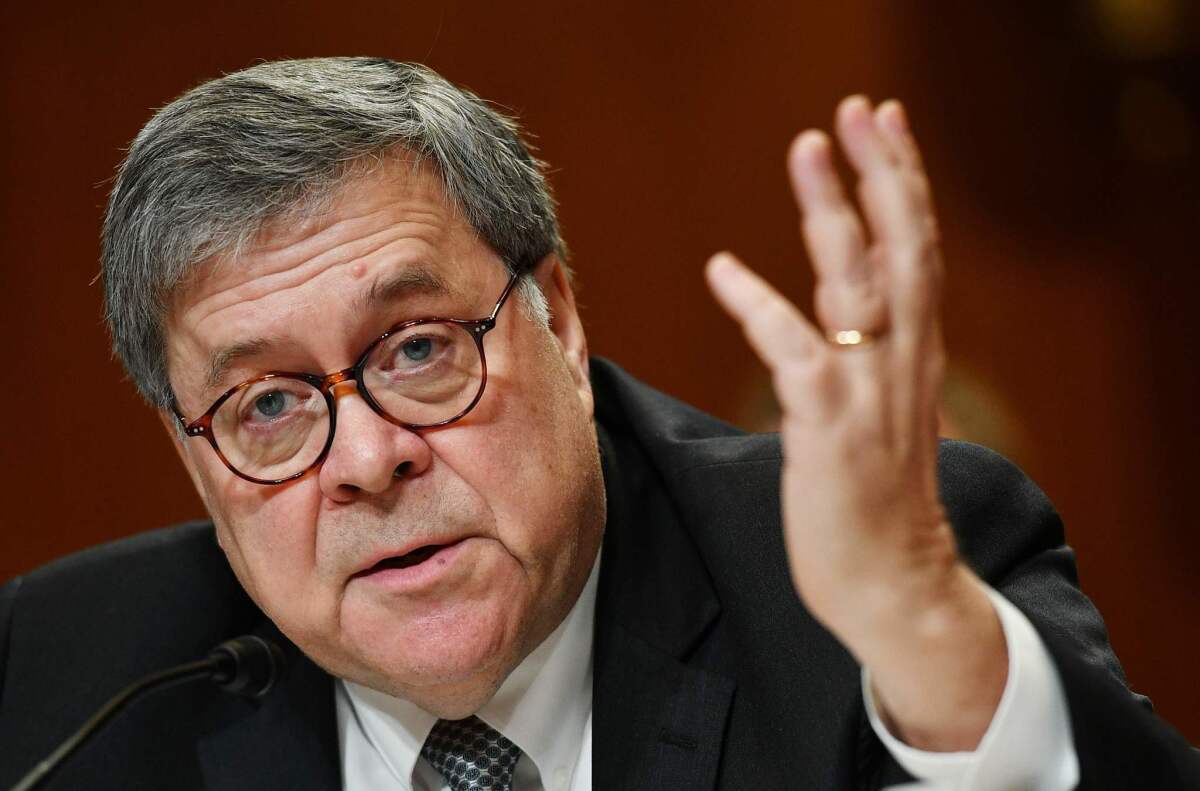Opinion: In Barr’s Bizarro World, politicizing criminal investigations is good

- Share via
Atty. Gen. William Barr gave a perplexing speech this week about the relationship between politics and prosecutorial decisions at the Justice Department.
Barr, remember, intervened to soften a sentencing recommendation by Justice Department prosecutors for Roger Stone, a confidant of President Trump’s who was convicted of seven felony counts, including witness tampering and lying to Congress. (Trump later tweeted: “Congratulations to Attorney General Bill Barr for taking charge of a case that was totally out of control and perhaps should not have even been brought.”)
Barr also moved to have a judge dismiss a charge against former Trump national security advisor Michael Flynn, who pleaded guilty to lying to the FBI. (Barr said he was acting on the recommendation of a prosecutor he asked to look into the case.)
That may look like politics infecting the administration of justice. But in the Bizarro World portrayed by Barr, some politicization of prosecutorial decisions is actually good thing.
Barr has denied doing Trump’s bidding in either the Stone case or the Flynn case. But in his speech Wednesday at Hillsdale College in Michigan, he made this argument:
“The most basic check on prosecutorial power is politics. It is counterintuitive to say that, as we rightly strive to maintain an apolitical system of criminal justice. But political accountability — politics — is what ultimately ensures our system does its work fairly and with proper recognition of the many interests and values at stake. Government power completely divorced from politics is tyranny.”
Barr cited decisions in which the Supreme Court struck down overly creative interpretations of criminal statutes defended by the Justice Department. He suggested that politically appointed attorneys general and U.S. attorneys can legitimately rein in prosecutors who act as “headhunters, consumed with taking down their target.”
He also contemptuously compared lower-ranking prosecutors to children: “Letting the most junior members set the agenda might be a good philosophy for a Montessori preschool, but it is no way to run a federal agency.”
The idea that political appointees might occasionally need to second-guess overzealous career prosecutors isn’t ridiculous. But politically appointed U.S. attorneys can also overreach — think of Rudolph W. Giuliani in his days in the Southern District of New York.
It’s worth remembering that a U.S. attorney position is often a steppingstone to elective office, as it was for Giuliani. Others in that club include former New Jersey Gov. Chris Christie and Dick Thornburgh, the former governor of Pennsylvania who later served as U.S. attorney general.
Who has more incentive to “headhunt” — an obscure career prosecutor or a politically connected U.S. attorney with an eye on the governor’s mansion?
Sometimes it is defensible, even desirable, for a politically appointed attorney general or U.S. attorney to overrule lower-ranking prosecutors. But Barr, who has exercised that authority to the benefit of associates of Trump, is probably the worst person to make that argument.
More to Read
A cure for the common opinion
Get thought-provoking perspectives with our weekly newsletter.
You may occasionally receive promotional content from the Los Angeles Times.











